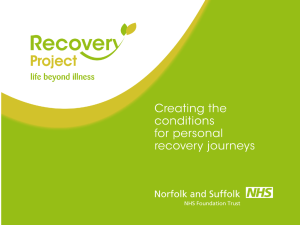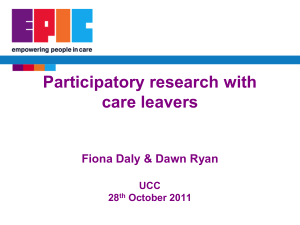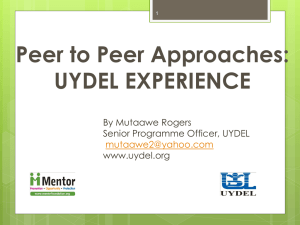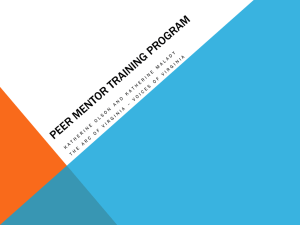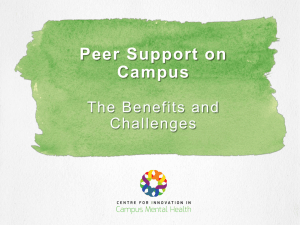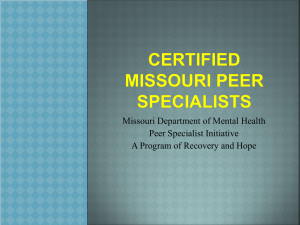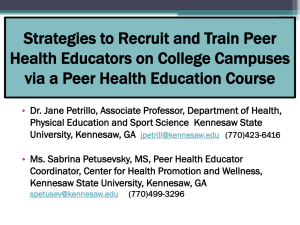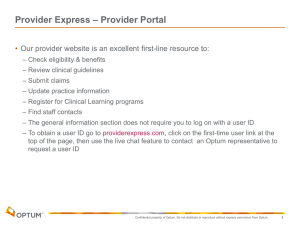Service users as peer research interviewers
advertisement
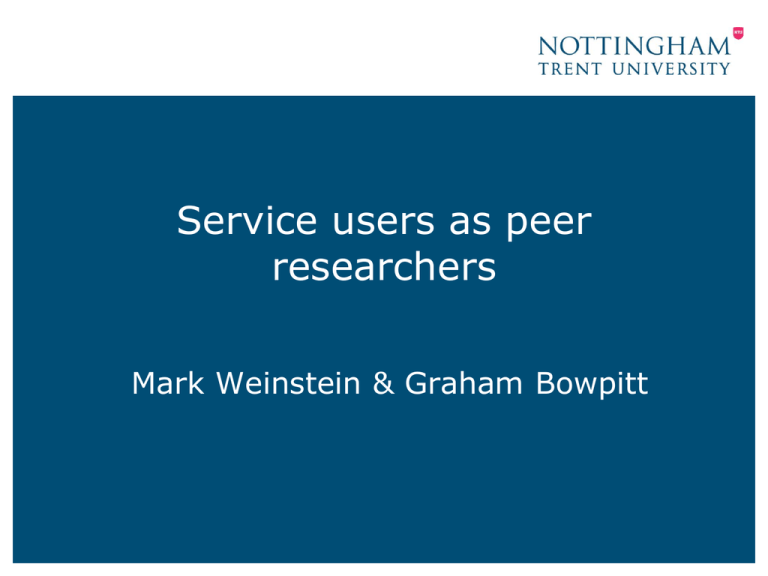
Service users as peer researchers Mark Weinstein & Graham Bowpitt Issues to be covered •What is ‘peer research’? •Why use service users as peer researchers? •A case study from homelessness research •What happened in practice? •What lessons can be learnt for research practice? What is ‘peer research’? •Peer research is an approach to research design in which ‘researchers’ are drawn from among the ‘researched’, i.e., from among the subject group of the research •The service user as peer interviewer arises where both interviewers and research subjects are recruited from among users of services, in this case, for homeless people Why do peer interviewing? 1. ‘Consumerist’: primarily benefits the research by incorporating participant perspectives into the research design & conduct 2. ‘Democratic’: primarily as a vehicle of empowerment in which control of the research process is ceded to participants •Raises issues concerning: –Practical limits to involvement of different groups –The extent to which genuine empowerment is possible & desirable Researching homelessness •Part of ESRC Multiple Exclusion Homelessness research programme •Aims to deepen our understanding of homelessness: –How do homeless people prioritise the problems they face? –How far do these priorities square with those of different support agencies? •105 interviews with homeless people in Nottingham and London, plus 44 interviews with key informants involved in the provision of services The peer researcher role •As co-designers of the interview schedules •As co-interviewers of single homeless research participants, alongside a member of the academic research team •As co-analysers of the data through focus groups at which early findings were presented •As co-disseminators of the findings through involvement in the production of a DVD Peer researcher recruitment, training & preparation •Potential peer researchers were identified by Framework & Thames Reach from amongst their ex-service user volunteers •Initial briefing session to inform them of the nature of the research & their potential role •Focus groups in Nottingham & London to develop the interview schedule •Peer researcher interview training day •Further London meeting prior to starting interviews Methodological issues encountered •Deficiencies in gender mix of volunteers •Variations in peer researcher knowledge, confidence, skill & performance: when (should) an academic intervene to cut off an irrelevant line of inquiry, significant omission or repetition? •Does such intervention assist the peer researcher or undermine their confidence? •How does one balance the tension between three conflicting interests: –The needs of the peer researcher –The patience of the respondent –The demands of the research agenda Ethical issues •Research participants often commented that the presence of peer researcher had engendered an atmosphere of trust •Peer researchers were often a calming presence for the academic researcher •Should peer researchers tell their own story / advise respondents? •Complexity of managing the interview & the peer researcher simultaneously •What to do when a peer researcher is absent? •The importance of individual de-briefing & periodic group sessions Post-interview participation •Data analysis workshops in Nottingham and London to discuss emergent findings •Invited to comment on our initial interpretation of the data •As equal participants through membership of the project steering group •As co-disseminators through the production of a DVD Benefits to all parties •To the project in enhancing the trustworthiness of the data •To the respondents in improving their sense of being heard & understood •To the peer researchers in enhancing their skills & employability: several have gone on to secure jobs, often in housing support work, since the end of the interviews Challenges for research practice •How do academic researchers induct & train peer researchers to work effectively in an environment that is alien to them? •Should academics be more selective in recruiting peer researchers? •How do academics resolve the conflicting priorities of training peer researchers & fulfilling project expectations? •In the end, what’s in it for peer researchers? •How far is genuine empowerment possible in the research process?

